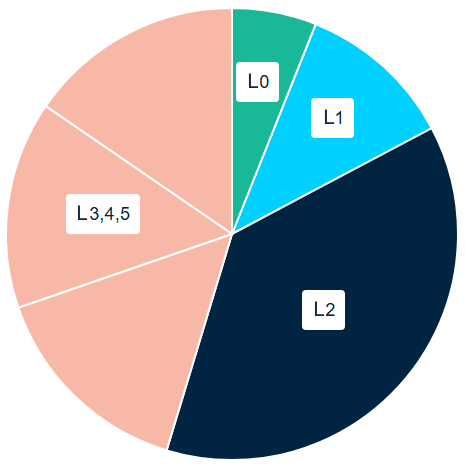Surveys and statistics
“Individuals’ knowledge and skills are a significant component of their individual well-being, but also an essential condition for a society’s development.”1

Programme for the International Assessment of Adult Competencies (PIAAC) – 2022 Results
PIAAC, an initiative of the Organisation for Economic Co-operation and Development (OECD), is a highly detailed survey that assesses literacy, numeracy, and adaptive problem-solving skills among adults aged 16 to 65 across more than 30 countries and sub-national regions, including all Canadian provinces.
In the context of PIAAC, literacy is defined as the ability to access, understand, evaluate, and analyze written texts in order to achieve one’s goals, develop knowledge and potential, and participate in society.
The OECD has divided the literacy proficiency scale into five levels, with an additional category: “Below Level 1”.

The survey published in October 2024 divided respondents into six levels of literacy, the first identifying adults who did not reach Level 1 (L0 – Below level 1)
8% of adults score below Level 1 (L0);
14% are at Level 1 (L1);
30% are ranked at Level 2 (L2);
while 48% are at Levels 3, 4 and 5 (L3,4,5).
Distribution of respondents by literacy level in Quebec

Initial observations2
In Quebec, 22% of the population, is likely to find himself in a situation where he has great or very great difficulty reading and using the written word. In 2013, 19% of respondents were at that level.
One person in three (30%) in Quebec is likely to find himself in a situation where his ability to read will be in proportion to the presence of facilitating conditions or non-complex written environments. In 2013, 34.3% of respondents were at that level.
Fewer than one person in two (48%) in Quebec is likely to demonstrate a command of literacy skills enabling them to read with a view to learning, comprehending, acting or intervening completely autonomously. In 2013, 46,7% of respondents were at that level.
To read the analysis of the results for Quebec, conducted by Pierre Langlois, economist for the Foundation: PEICA Canada 2022 – Analysis of new data for Quebec
Statistics Canada and the Institut de la statistique du Québec will be publishing statistical reports in the next few months that will help present a detailed picture of the findings for the population of Canada and Quebec. These reports will be added as they are released.
Sources :
1PAGEAU, D. L’information continue Express, Ministry of Education, Recreation and Sports (MELS),, 2005
2Literacy, numeracy and adaptive problem-solving skills of Canadians: Results from the 2022 Programme for the International Assessment of Adult Competencies [https://www150.statcan.gc.ca/n1/daily-quotidien/241210/dq241210a-eng.htm ], October 2024








